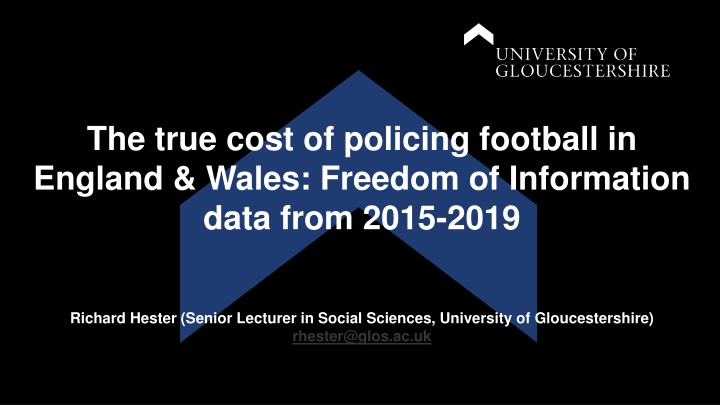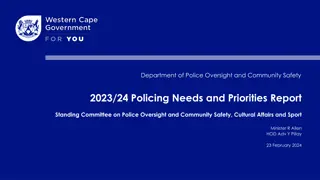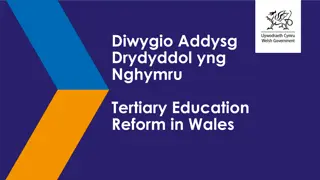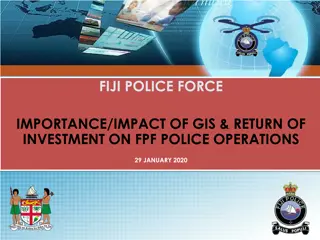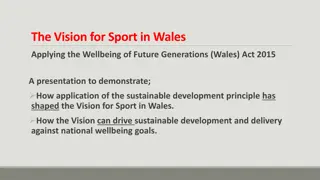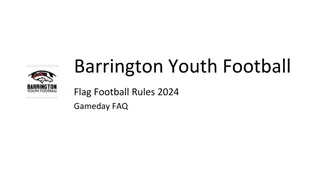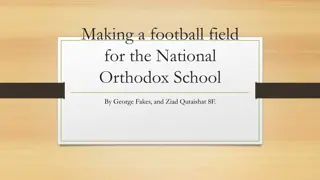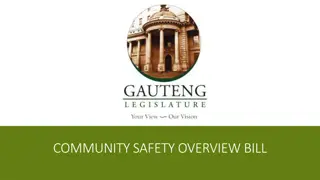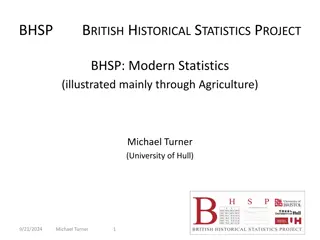The True Cost of Policing Football in England & Wales: A Research Study
University of Gloucestershire's Senior Lecturer, Richard Hester, conducted a study on the actual expenses associated with policing football in England and Wales from 2015-2019. The research reveals discrepancies between official figures and actual costs incurred, highlighting the need for transparency and accountability in the funding of football policing operations.
Download Presentation

Please find below an Image/Link to download the presentation.
The content on the website is provided AS IS for your information and personal use only. It may not be sold, licensed, or shared on other websites without obtaining consent from the author.If you encounter any issues during the download, it is possible that the publisher has removed the file from their server.
You are allowed to download the files provided on this website for personal or commercial use, subject to the condition that they are used lawfully. All files are the property of their respective owners.
The content on the website is provided AS IS for your information and personal use only. It may not be sold, licensed, or shared on other websites without obtaining consent from the author.
E N D
Presentation Transcript
The true cost of policing football in England & Wales: Freedom of Information data from 2015-2019 Richard Hester (Senior Lecturer in Social Sciences, University of Gloucestershire) rhester@glos.ac.uk
Research context Legal ruling - police cannot charge for resources deployed under SPS on public land outside a football ground (Ipswich Town Football Club v Suffolk Police, 2017). Policing football in England & Wales costs 48m, with only 5.5m being recovered by police forces (South Yorkshire Police, 2019). These figures were debated in Parliament and uncritically accepted as reliable. NPCC strategic lead for policing, Chief Constable Mark Roberts, called for legislation change and for the football industry to pay more towards policing costs for policing football (Sky Sports News, 2019). Research is critical of excessive police resourcing at football (Stott et al. (2019), and improved dialogue between police and football supporters could lead to a reduction in football related violence (Stott et al., 2012; 2018; 2019). Following the Ipswich ruling, Hester (2020) suggests that research is needed to clarify how taxpayers money is being spent on football policing, to ensure an informed debate on the issue. 2
Methods FOI is a valid, but underutilised tool in social science research (Walby & Luscombe, 2017), however it is challenging to obtain due to cost exemptions associated with organisations retrieving the data (Lee, 2005). The following FOI was sent to all 43 police forces in England & Wales: From the 2014/15 to 2018/19 football seasons, how much Special Police Services have you received each season from football clubs in your force area? From the 2014/15 to 2018/19 football seasons, how much have you spent each season on football policing operations? To establish further detail about the figures produced in 2019, an FOI was sent to South Yorkshire Police, and the NPCC: You have stated that: Police forces nationally charge clubs 5,479,763.76, and unrecovered cost to police football nationally is 42,526,149.79. Please explain how both these figures have been calculated What is the timeframe that both these figures relate to? All FOIs were submitted between March 2021 and January 2022. 3
Findings Most police forces are not actively calculating how much they are spending on football policing (entered as no data in Figure 1). Only 9 police forces were able to provide accurate data on how much they were spending on football policing, some were actually making a profit from football policing. Average SPS received each season was 10,172,434. Total SPS received in 2017/18 was 12,580,289, which is more than double the amount quoted by South Yorkshire Police / NPCC. The FOI data does not align with South Yorkshire Police / NPCC data. The NPCC advised that they no longer hold the data or methodology used to calculate the figures that had been put into the public domain. 4
Implications The lack of transparency over the South Yorkshire Police / NPCC data is concerning cannot be judged as accurate if there is no record of the methodology used to calculate it. Despite some police forces providing data on the cost of policing football, it is not known how each force has calculated this. There are still a further 30 police forces that would need to be spending about 1m each on policing football to reach the suggested total of 48m. Given the data already indicates that most forces are not spending that much, and the relatively small size and lack of demand for football policing in some forces, the 48m can be seen as an overestimate as opposed to a reliable fact. There is disparity in resourcing between police forces, supporting existing research (see Stott et al, 2018; 2019; Hester, 2020). If measures suggested by Stott et al. (2019) of better risk assessment, and more targeted, liaison based resources were allocated to football, this could reduce policing costs. Research needs to be commissioned, so the true cost of policing football in England & Wales can be accurately established. 5
References Hester, R. (2020). Assessing the UK Football Policing Unit Funding of Football Banning Orders in Times of Policing Austerity. Policing: A Journal of Policy and Practice, doi: 10.1093/police/paaa015. Ipswich Town Football Club Company Limited vs. The Chief Constable of Suffolk Constabulary [2017] EWCA Civ 1484. Available at: https://www-lexisnexis-com.glos.idm.oclc.org/uk/ Lee, R.M. (2005). The UK Freedom of Information Act and Social Research. International Journal of Social Research Methodology, 8(1), pp. 1-18. doi: 10.1080/13645570500046624 Sky Sports News (2019). Football disorder impacted by police costs, says senior officer , 18 March. Available at: https://www.skysports.com/football/news/11095/11669527/football-disorder-impacted-by-police-costs-says-senior-officer South Yorkshire Police (2019) Football Costs Ref 20190645. Available at: https://www.southyorks.police.uk/find- out/accessing-information/request-information-under-the-freedom-of-information-act/football-costs-ref-20190645/ Stott, C., Hoggett, J., and Pearson, G. (2012). Social Identity, Procedural Justice and the Policing of Football Crowds . British Journal of Criminology, 52(2): 381 399. Stott, C., West, O., and Radburn, M. (2018). Policing Football Risk ? A Participant Action Research Case Study of a Liaison-Based Approach to Public Order . Policing and Society, 28(1): 1 16 Stott, C., Pearson, G. & West, O. (2019). Enabling an Evidence-Based Approach to Policing Football in the UK. Policing: A Journal of Policy and Practice, 14(4), pp. 977-994. doi: 10.1093/police/pay102 Walby, K. & Luscombe, A. (2017). Criteria for quality in qualitative research and use of freedom of information requests in the social sciences. Qualitative Research, 17(5), pp. 537-553. doi: 10.1177/1468794116679726 6
